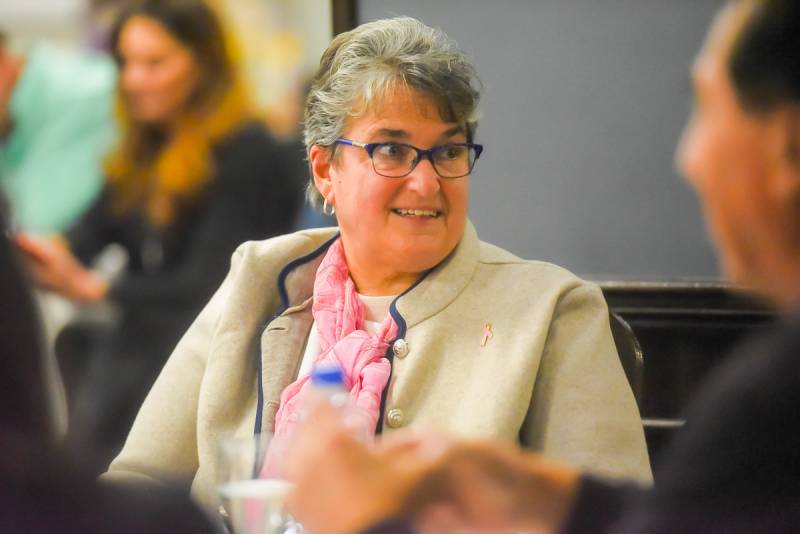
Nearly 3,000 households in Genesee County receive SNAP benefits on behalf of 4,796 adults and children, for a total mandated expense of $835,256 a year that’s on the table for cuts, Legislative Chairwoman Shelley Stein says, as part of the promoted “big, beautiful bill” in the House.
For the sake of argument, she rounded that up to an even $1 million and made her point crystal clear.
“That’s what the county would have to pay,” Stein said after an online meeting with New York State executives about potential repercussions from a proposed $15 billion in annual cuts plus mandated costs that would heavily affect state Medicaid, healthcare and SNAP (Supplemental Nutrition Assistance Program).
While some taxpayers may champion cost-cutting measures to reduce government spending, Stein said some of these measures are likely to fall on taxpayers' shoulders.
“We don’t have a choice to say no,” Stein said. “It’s like the two-headed llama of push and pull, and the push is coming from the federal government. We don’t know what the response is going to be from the state government, but it’s important for our budget folks at the county to understand what that budget impact could be and be really factual about it. So that’s a big job for our staff, because what we saw today was the first time we’ve seen numbers about any program.”
Genesee County officials believe their voices are important, she said, by sending messages to Congresswoman Claudia Tenney seeking her support and explaining that “if our levy is $30 million for Genesee County, any impact on that is going to cost our taxpayers,” Stein said.
“It will also impact on our ability to do roads and bridges. It'll impact our ability to invest in our machinery. We just … moved from leasing a piece of equipment to owning a piece of equipment, which was with the wheel loader. But because we didn't have access to resources, we still owned the county nursing home, we were really struggling with our budget, so we're coming out of that. We know that there will be an impact. We just don't know of the total impact of it yet,” she said. “So somewhere there is going to be a compromise down the road. There has to be, because the counties are the backbone of being program providers for both the federal and state governments. I just hope they don't get us to the last inch of the cliff before those two levels of government can hear us.”
What makes you feel that compromise is possible, given that the federal government has not seemed so inclined to bend lately?
“Those are the programs put into place by the state and the federal government, which are put into practice by counties. They need us, and if we cannot sustain ourselves, I don't want to go down that road,” she said. “I’m probably more practical right now than most people. But I'm raising the voice of Genesee County. I am raising the voice of our taxpayers to our congressional representative, which is the thing to do right now, right? And we have a relationship. She's been to our county. She knows who we are. She comes from a rural area. She has that understanding, and she comes from an agriculturally backed family, so she takes that with her.”
Stein is also counting on Sen. Chuck Schumer's support. He has been “an incredible supporter of our STAMP campus and the companies that are investing there.” He and others “know who we are,” which bodes well for this county, she said.
She also wanted to make the point that New York is different from other states when it comes to federal funding.
“So when the federal government makes cuts, it doesn't impact the state, it impacts counties directly,” she said. “I think that folks don't understand that, and that's important to understand.
“So, where other states -- every other state -- is going to feel the impacts of whatever federal cuts happen. They're going to feel it at the state level. We're going to feel it directly at the county level. So, of course, it's going to be different for us in New York,” she said. “Do we know exactly how much it's going to impact us? Today was the first time that I'd actually seen numbers for our county.”
Other financial items being considered in the bill include:
- $1.3 billion increase in uncompensated care costs for hospitals.
- $3 billion in Medicaid costs shifted to NYS every year.
- Over 1 million Medicaid enrollees (15% of the entire program) would lose coverage.
- Work requirements and other changes would increase administrative costs by more than 20%.
The bottom line message via meeting host, Executive Director and general counsel for the state Association of Counties Stephen Acquario was that, without immediate congressional action to prevent these cuts and resulting outcomes, New York and its counties “face an unsustainable $15 billion negative impact that will force choices between raising taxes or eliminating essential services for our most vulnerable residents.”
The report prompted Chautauqua County Executive Paul Wendel Jr. to pitch a scenario of a collision between federal and state entities. He asked if Hochul had information that would indicate any type of compromise.
“This is a dangerous game of chicken,” he said.
Jen Metzger disagreed with compromise as a solution.
“We don’t want our citizens here in New York State losing their health care, and we have to push, push, push at the federal level,” the Ulster County executive said. “Depriving people of healthcare is not the way we want to go.”
There was still no consensus about the bill as of Wednesday night, though some officials said they were getting closer, as House Speaker Mike Johnson and the president worked to secure enough votes for passage, according to a New York Times article.
